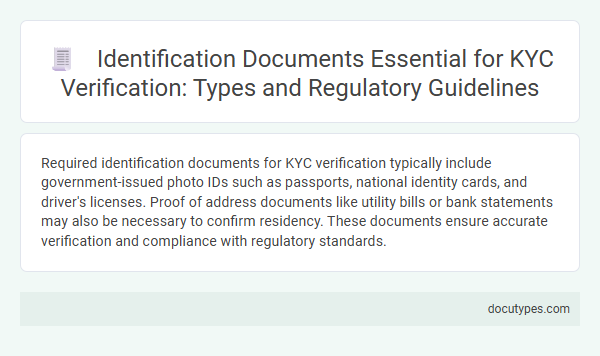Required identification documents for KYC verification typically include government-issued photo IDs such as passports, national identity cards, and driver's licenses. Proof of address documents like utility bills or bank statements may also be necessary to confirm residency. These documents ensure accurate verification and compliance with regulatory standards.
Overview of KYC Verification and Its Importance
KYC verification requires valid identification documents to confirm your identity and prevent fraud. Commonly accepted documents include passports, national ID cards, and driver's licenses.
These documents ensure regulatory compliance and enhance security by verifying personal details accurately. KYC verification helps financial institutions and businesses maintain trust and meet legal obligations.
Regulatory Guidelines Governing KYC Processes
Which identification documents are required for KYC verification? Regulatory guidelines mandate specific documents to ensure identity authenticity and compliance with anti-money laundering (AML) laws. Valid government-issued IDs such as passports, national ID cards, and driver's licenses are commonly accepted for KYC processes.
Primary Identification Documents Accepted Worldwide
Primary identification documents are essential for KYC verification to confirm an individual's identity accurately. These documents are universally recognized and accepted by financial institutions and other regulatory bodies worldwide.
- Passport - A government-issued travel document proving citizenship and identity across international borders.
- National Identity Card - An official card issued by a country's government serving as proof of identity and residency.
- Driver's License - A government-issued document granting driving privileges while serving as a widely accepted form of ID.
Using these primary documents ensures compliance with global KYC standards and reliable verification processes.
Secondary Identification Documents for KYC
Secondary identification documents provide additional proof of identity during KYC verification. These documents help verify identity when primary documents are unavailable or incomplete.
- Utility bills - Recent utility bills confirm the applicant's residential address.
- Bank statements - Official bank statements support financial identity and address verification.
- Government-issued ID cards - National or regional ID cards supplement primary documents with further identity assurance.
Country-Specific KYC Document Requirements
Identification documents required for KYC verification vary significantly by country. Governments enforce specific regulations to ensure accurate identity verification tailored to local legal frameworks.
In the United States, documents like a valid passport, state-issued driver's license, or Social Security card are commonly accepted. India mandates Aadhaar cards, PAN cards, or voter ID cards for KYC compliance. European countries often require national ID cards or passports, reflecting regional identity standards.
Digital Identification and Electronic KYC (e-KYC)
Digital Identification and Electronic KYC (e-KYC) streamline the verification process by using government-issued IDs such as passports, driving licenses, and national ID cards. These documents are scanned and authenticated electronically, reducing the need for physical paperwork. e-KYC leverages biometric verification and secure data transmission to ensure accuracy and prevent identity fraud during customer onboarding.
Common Challenges in Document Verification
KYC verification requires government-issued identification documents such as passports, driver's licenses, or national identity cards to authenticate a user's identity effectively. Common challenges in document verification include poor image quality, expired documents, and inconsistent data across submitted files. These issues often lead to delays, increased manual review, and potential rejection of the identity verification process.
Anti-Money Laundering (AML) Compliance and KYC
KYC verification requires specific identification documents to ensure compliance with Anti-Money Laundering (AML) regulations. You must provide valid and verifiable documents to meet regulatory standards.
- Government-Issued ID - A passport, driver's license, or national ID card is essential for verifying your identity.
- Proof of Address - Utility bills, bank statements, or rental agreements confirm your residential address for KYC checks.
- Photograph - A recent passport-sized photo is often required to match your physical appearance with the identification documents.
Best Practices for Secure Document Collection
| Identification Documents Required for KYC Verification | Government-issued photo ID such as passport, national ID card, or driver's license |
|---|---|
| Address Proof | Utility bill, bank statement, or rental agreement issued within the last 3 months |
| Additional Documents | Social Security number verification or tax identification where applicable |
| Best Practices for Secure Document Collection |
Use encrypted transmission methods to protect sensitive data during upload. Implement multi-factor authentication for access to documents. Store documents in secure, access-controlled servers. Verify document authenticity using automated tools and manual review. Limit data retention to necessary timeframes in compliance with regulations. Educate users on submitting clear, legible, and recent official documents. Confirm the data matches across multiple documents to prevent fraud. Employ secure channels for communication and document submission. Maintain an audit trail for all document handling activities. Regularly update security protocols to address emerging threats. |
Which Identification Documents Are Required for KYC Verification? Infographic

